Ellen and Jim Have a Blog, Too
We are two part-time academics. Ellen teaches in the English department and Jim in the IT program at George Mason University.


_Pallisers_ 3:5: A day or so later (Breakfast & St Bungay comes to call) (2) · · 1 December 07
Dear Harriet,
As promised, here is a transcript of the second scene Raven developed from CYFH?, Ch 58 (“The Pallisers at Breakfast”); this time he took some material from the opening of the next chapter, 59 (“The Duke of St Bungay in search of a minister”):
3:5, Episode 22 (“Grandfather’s Will”), Scene 3:
An elaborate gilded (much gold everywhere, from pillars to small ornaments) drawing room, London
1 The establishment shot shows us a hand playing cards, then that Lady Glen (Susan Hampshire) is the owner of the hand. The camera widens out and we see the background.
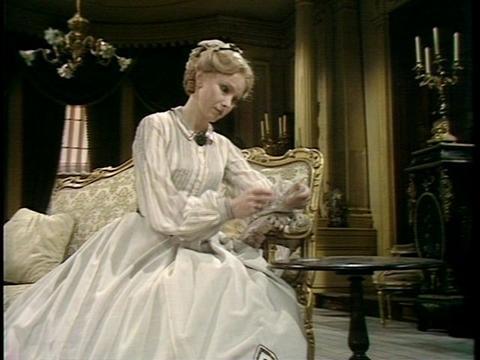
She shuffles her cards. They fall. “Oh!”
2 Conversation pair.
Plantagenet (Philip Latham) comes in with a newspaper. He gently kneels down to help Lady Glen pick up the cards.
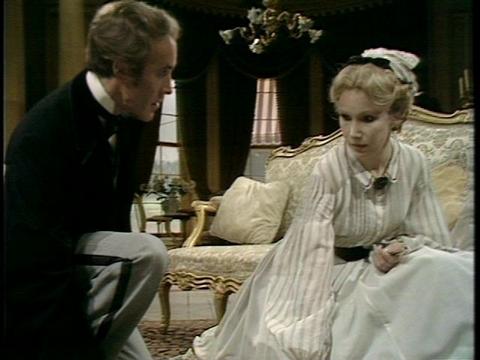
(Emblematic: they will have to pick up the cards they have been dealt and build a life together.)
Plantagenet: Cora. I have been thinking of everything that you told me, about Mr Fitzgerald.
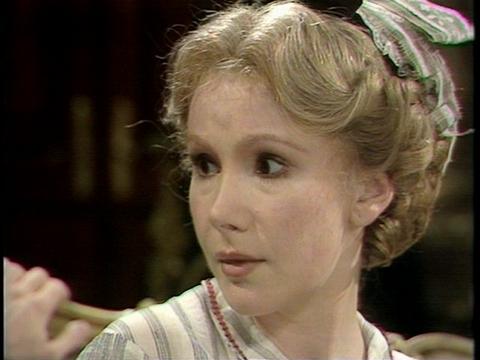
Lady Glen: It is true, Plantagenet. I have always loved him, and we’re never loved each other.
Plantagenet (strongly plangent expression on his face): But I love you. (Tears in his voice.) If you cannot love me, it is a great misfortune for us both, but we need not therefore be dishonoured.
Lady Glen: But I cannot make you happy (whisper this). I haven’t even given you a child.
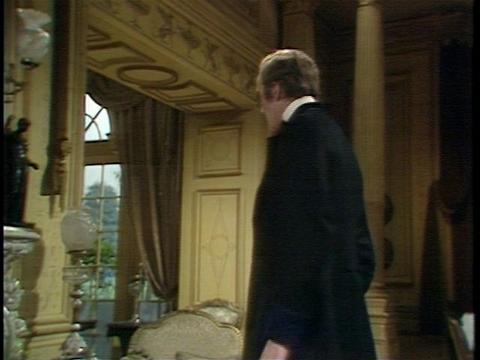
He turns away.
Plantagenet (turning round to her): Oh Cora, my dear, you think too much about that. Much more than I do. I have never made any complaint on that head.
Lady Glen: But I know what you thoughts are.
Plantagenet: (he now approaches her) Then you wrong my thoughts. Cora, have I ever told you false?
Lady Glen (whispers): No (shakes her head and looks down), no, you can never be false.
Plantagenet: Then believe me. If you will try to love me, then child or no child, now or ever, it is you alone that I want for my wife.
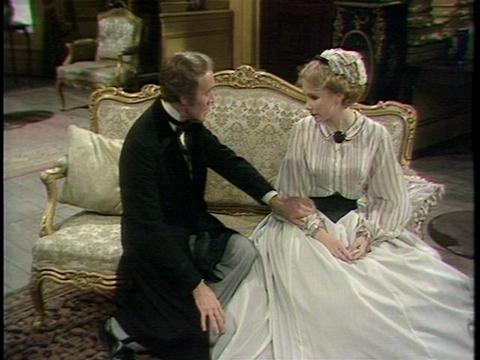
Lady Glen: (Camera on her. Close-up of her face poignant and filled with emotional pain taken from his.)
Plantagenet: Can you try to love me?
Lady Glen: First I must try not to love him.
Plantagenet (whispers): Exactly so.
We hear clock ticking in background.
Plantagenet (rises): I think we had better go away for a while. I … I shall give up politics for this season.
Lady Glen (turns away alertly): But politics is your life!” (She does not understand.)
Plantagenet: Already it is spring. I think we should go to Europe again. Perhaps not to Switzerland, but France, Germany, and Italy where you admired those statues so much [alluding to painful difference between their temperaments which emerged in 1:2, how they respond differently to art, he sophisticatedly as art, she directly as if the statue were real, she ridiculing his taste, he seeing her response as childlike]. Perhaps your friend, Miss Vavasour would come with us. (A knock. He puts his hand on her aim, half-kneeling. He walks off, sick in his face, enigmatic in his face as he knows this is Bungay come to offer him office.)
Plantagenet: Come in!
3 Conversation pair widens out to include threesome interaction.
Collingwood (high status male servant, Maurice Quick)) comes in, opens door. If you please, sir, the Duke of St Bungay is here.
Plantagenet: Would you tell his Grace that I am engaged.
Lady Glen: (Turns back to look at Plantagenet from her seat on the sofa.) Nonsense, Plantagenet. Collingwood, would you be please show the duke in.
Collingwood bows himself out.
4 Conversation pair.
Lady Glen: You know why he’s come.
Plantagenet nods.
Lady Glen. Plantagenet, if the Duke says what I think he will say, what you think he’ll say, you must think no more of Italy.
5 Conversation widens to include five as Collingwood ushers in Duke.
Collingwood: The Duke of St Bungay.
Lady Glen goes to greet him (Roger Livesey): Ah!
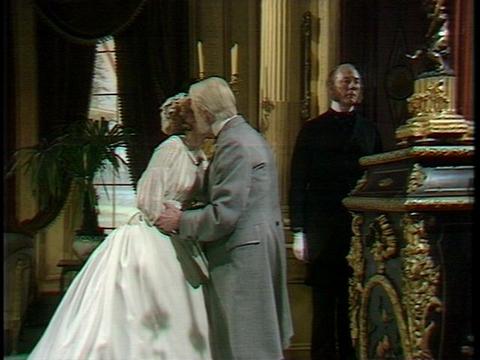
Courteous kiss.
Bungay: I hope I haven’t disturbed you, my dear.
Lady Glen. No, but you’ve certainly disturbed Mr Palliser. (He chuckles.) Now go to him quickly or he’ll burst before you get there.
She leaves.
A comparison of Trollope’s text with Raven’s (apart from all other considerations) shows Raven leaves out words like this Trollope uses of Palliser hearing his wife say she would run away with Burgo, loves Burgo, “the poison was beginning to take effect”; he also omits strong phrases from Lady Glen, for example, saying she wants to kill herself. These are instead conveyed by the actors’ faces and body gestures.
********
In the 1974 BBC CYFH? (3:5), Raven develops two scenes from the matter from “The Pallisers at Breakfast” (Ch 58 of CYFH?). The first is the first scene of the first episode (21) of 3:5; it’s juxtaposed directly after the last two scenes of 2:4, the ball scenes and then the non-elopement and scene where Burgo (Barry Justice) stands below Lady Glen’s (Susan Hampshire) window and silently urges her to flee.
Then much intervenes in the film whose back story is about 2 male outcasts (George Vavasour and Burgo Fitzgerald). We have in Episode 21, George (Gary Watson) and Burgo (Barry Justice) at the club, the death of Squire Vavasour, George coming to Vavasour hall for the reading of the old man’s will; Episode 22 continues 21 with a scene of the reading of the will, and on the Westmoreland moor, George Vavasour wrenching Alice Vavasour’s (Caroline Mortimer) arm after he discovers he has been disinherited and Alice refuses to agree to fight their grandfather’s will on the grounds he was not sane or competent.
In Trollope’s novel, George wrenches his sister Kate’s arm; Trollope made Kate the heir (in Raven’s film Mr Vavasour, John Glyne Jones, genuinely grieved at his father’s death, is the heir). Kate (Karen MacCarthy) is nowhere as important a character in Raven’s film as she is in Trollope’s novel. Raven has replaced Kate with Alice partly in order to make a parallel with the above scene, and from 1:2 through 3:6 to make a parallel and contrast between two triangles: George & John Grey & Alice Vavasour; Burgo Fitzgerlad & Plantagenet & Lady Glencora Palliser. In the scene after his grandfather’s will disinheriting him has been read, George is a desperate man, deprived of any means of fulfilling his dream of a career in parliament, and he turns brutal, violent (even to women), and as amoral as all those around him have been to him; in Plantagenet we have Raven’s portrait of a gentleman.
Raven’s book, The Idea of a Gentleman shows how Raven had in his mind an ideal picture of a virtuous upper class male, noble, decent, never doing a dishonorable deed, and argued that from the time this ideal emerged in Victorian society it was also utterly irrelevant to the way the social order worked. Nonetheless, in his conception of Plantagenet Palliser, Raven dramatized this ideal.
The centrality of the figure of Lady Glen and the posture of the male throughout this series of stills reveals one of the ultimate origins of these mini-series and their sources, the great long partial love-story novels of private life and politics in 17th century heroic romances, a number of them by women. When Plantagenet Palliser kneels down openly vulnerably to his wife, and begs her to try to love him, if we dressed the actors in later 17th century costumes, this could be scene from Madeleine de Scudery’s Clelia. Opera stories often come type stories like this later 17th century subgenre, the first genuinely to reflect women’s points of view in a popular format; the masterpiece in the first era in the kind was Marie de Lafayette’s Le Princess de Cleves.
I do like the beauty and fineness of feeling—it contrasts remarkably with the ugliness, crude coarseness of mind of Raven’s Duke of Omnium (Roland Culver) who in first telling Plantagenet he is absurd in caring for his wife and giving up the office, then says repeatedly he needs to give her a baby, and thus he needs to pray. Pray becomes a substitute for fuck; so the Duke is saying they need fucking. As the Part ends with their intense clash over gambling and attitudes of mind portrayed there, we see how not only animal-like is the Duke, but how inadequate his notion of what life’s about if you account happiness of any importance for male and female alike.
Sylvia
--
Posted by: Ellen
* * *
Comment
commenting closed for this article
